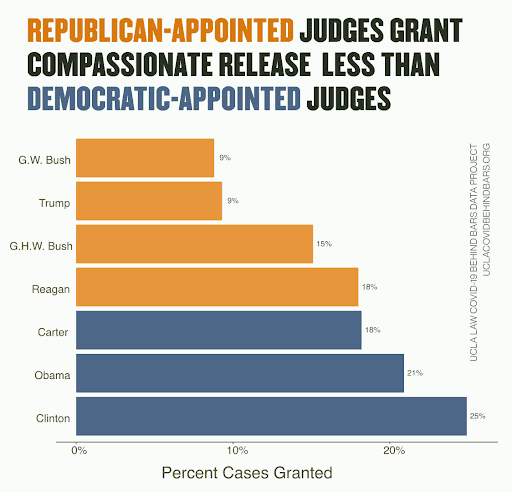September 10th, 2021 • Victoria Finkle and Hope Johnson
The Life or Death Stakes of Partisan Politics Behind Bars
Throughout the pandemic, incarcerated people, though facing outsized health risks, have had few options for emergency release. While in some instances, governors and other officials have heeded public health calls for decarceration, in the vast majority, they have not.
As a result, people incarcerated in federal prisons during the pandemic have largely been left with just one option to escape the virus in their facilities: compassionate release. Designed specifically for old and infirm people facing “extraordinary and compelling” circumstances, and expanded as part of the 2018 First Step Act, compassionate release became the last resort and final hope for countless medically vulnerable people who have feared for their lives while COVID-19 spread among their peers, cellmates, and neighbors.
For a number of reasons, however, that potentially life-saving option has been denied to thousands of people during the pandemic. A report released this summer by the federal government revealed that as many as 80 percent of the compassionate release motions filed by people incarcerated in federal prison during the pandemic were rejected by a judge.
Just as troubling, a recent paper by Georgetown Law student Victoria Finkle shows how arbitrary so many of those denials were. Those life-or-death decisions, she found, rather than being made only on the individual merits of the case, informed by a medical analysis of the petitioner’s vulnerabilities and risks of complications from COVID, were likely shaped by partisan ideology.
In her paper, “How Compassionate? Political Appointments and District Court Judge Responses to Compassionate Release during COVID-19”, Finkle investigated how judges appointed by Republican presidents and those appointed by Democratic presidents have ruled in more than 4,000 federal compassionate release cases in the federal prison system since March 2020.
She found stark disparities in compassionate release grants between those two groups: judges appointed by Democrats have granted compassionate release at far higher rates than judges appointed by Republicans.
Specifically, she found that judges appointed by Democrats have been more than twice as likely to grant compassionate release during the COVID-19 pandemic. Judges appointed by Presidents Trump and W. Bush granted compassionate release in approximately nine percent of all petitions reviewed; by comparison, judges appointed by Obama and Clinton granted compassionate release at 21 percent and 25 percent, respectively.

This disparity reveals a compassionate release regime that, like so many aspects of the criminal legal system, is deeply broken and overly politicized. Whether you are granted life-saving emergency release during a global health crisis should depend on scientific, objective factors, such as your health status or medical history; it should not depend on the president who appointed the judge you happen to have been assigned.
next post
September 24th, 2021
Testimony to Georgia House Democratic Caucus Committee on Crisis in Prisons
This week, we provided testimony to the Georgia House Democratic Caucus Committee on Crisis in Prisons on the state of COVID-19 in Georgia state prisons. Here's what we said.